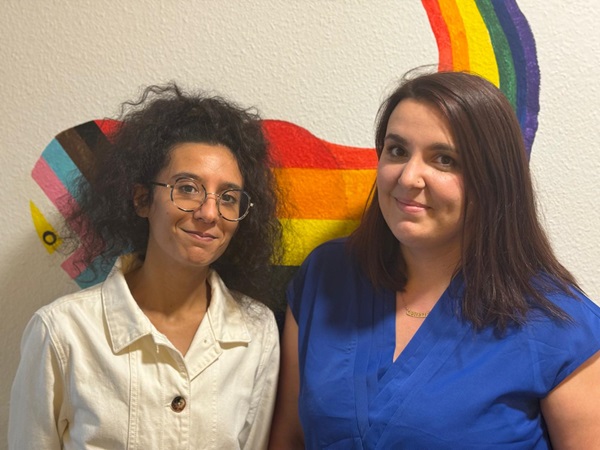 (L-R) Nada Negraoui, LILI coordinator; Ophélie Charaux, LILI communications officer;
Credit: LILI
(L-R) Nada Negraoui, LILI coordinator; Ophélie Charaux, LILI communications officer;
Credit: LILI
The Luxembourg Institute for LGBTIQ+ Inclusion (LILI) is a structure created on 17 May 2024, dedicated to collecting and analysing data and raising awareness of the discrimination suffered by lesbian, gay, bisexual, transgender, intersex and queer (LGBTIQ+) people in the Grand Duchy.
Speaking to Chronicle.lu, Nada Negraoui, coordinator of LILI, delved into the details of this new research institute.
Chronicle.lu: Please elaborate on the goals and primary functions of the newly established Luxembourg Institute for Inclusion (LILI).
Nada Negraoui: LILI conducts studies and collects data on LGBTIQ+ people's experiences of violence and/or discrimination. This can include statistical surveys, qualitative interviews and longitudinal studies. The aim is to document and understand the different types of discrimination faced by the LGBTIQ+ community in various contexts (family, work, education, health, etc.) and in all its diversity.
Chronicle.lu: How does the Centre LGBTIQ+ Cigale plan to use the data and insights gathered by LILI to address and reduce discrimination against the LGBTIQ+ community?
Nada Negraoui: The mixed methodologies deployed by LILI make it possible to characterise in detail the different types of exposure to violence by breaking it down by living space (intimate, family, social, professional, school, etc.), and from an intersectional perspective according to the profile of the people surveyed (sexual orientation, gender identity, racial origin, social origin, disability, etc.). Based on the data collected, LILI analyses the trends, motives and factors that contribute to LGBTIQ+ violence and discrimination. It produces reports and analyses that highlight the specific challenges faced by heterogeneous LGBTIQ+ communities, as well as recommendations for combating such violence and discrimination.
Chronicle.lu: What specific trends or changes have you observed in the statistics on discrimination against the LGBTIQ+ community in Luxembourg over the past two years? Was this part of the reason for the creation of LILI?
Nada Negraoui: Since 2022, the Cigale centre has seen an increase in requests for interviews and follow-up relating to LGBTIQ+ phobias. In addition, the CIGALE teams are seeing the emergence of a public that we no longer thought we would see, with family exclusions on the grounds of sexual orientation. We are also seeing an increase in transphobic acts. Discrimination affects the children and parents of rainbow families. Generally speaking, discrimination linked to sexual orientation and gender identity is on the increase and becoming more serious.
Chronicle.lu: In what ways do you believe the work of the Centre LGBTIQ+ CIGALE and LILI will contribute to greater visibility and support for the LGBTIQ+ community in Luxembourg?
Nada Negraoui: First of all, LILI is in line with the latest recommendations of the ECRI report (European Commission against Racism and Intolerance, 27 June 2023) which urges Luxembourg to improve data collection: "...it should also be noted that at the national level, data and studies relating to LGBTI persons are still fairly rare. ECRI strongly encourages Luxembourg to carry out regular studies and improve data collection in the field of equality concerning the situation of LGBTI persons".
The invisibilisation of minorities is one of the factors contributing to discrimination against persons with a minority identity. This invisibilisation takes several forms, one of which is the lack of data on experiences of violence or discrimination. Without statistical data, the discrimination experienced cannot be quantified or officially recognised. This prevents recognition of the specific problems faced by LGBTIQ+ people, making them invisible to political and legislative decision-makers, employers and the general public. This makes it difficult to advocate for legislative changes or specific initiatives.
In addition, discrimination issues are less likely to be addressed in public debate if they are not backed up by data, as the media and researchers tend to focus on well-documented problems, with the risk of overlooking those that are not supported by statistics.
Without data, it is also more difficult to deconstruct stereotypes and prejudices. Misconceptions about discriminated communities can persist and be reinforced because there is no data to objectively contradict them. Potential allies, whether other marginalised groups or human rights organisations, may be unaware of the extent of the discrimination suffered, limiting solidarity and support.
In conclusion, the invisibility of the violence and discrimination suffered by LGBTIQ+ people limits recognition, understanding and the ability to act on it. LILI’s activity takes place in this area of recognition and understanding.
All the online surveys can be found on the www.lili.lu website.
A statistical survey and free testimony forms are available at the following website, both for the people concerned and for allies, friends, families and colleagues who are essential witnesses to the visibility of violence and discrimination: https://linktr.ee/lililuxembourg.








